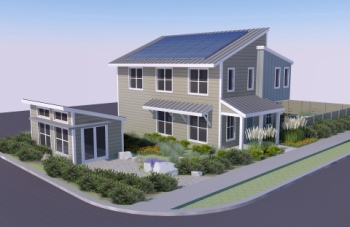Apr 25 2013
American Honda Motor Co., Inc. today announced its plan to create the Honda Smart Home US, a showcase for environmental innovation and renewable energy enabling technologies that demonstrates Honda’s vision for sustainable, zero-carbon living and personal mobility, including the use of solar power to charge a Honda Fit EV battery electric vehicle.
 A rendering of the Honda Smart Home US, a showcase for environmental innovation and renewable energy enabling technologies that demonstrates Honda's vision for sustainable, zero-carbon living and personal mobility. (Graphic: Business Wire)
A rendering of the Honda Smart Home US, a showcase for environmental innovation and renewable energy enabling technologies that demonstrates Honda's vision for sustainable, zero-carbon living and personal mobility. (Graphic: Business Wire)
A groundbreaking today at the construction site on the campus of the University of California, Davis, marked the start of the building process, which will be documented and shared through the Honda Smart Home US website.
Envisioning a lifestyle of renewable energy for home and transportation, the Honda Smart Home US will feature new and emerging technologies to greatly reduce the amount of energy consumed by individual households, and will provide a pathway for the full integration of electric vehicles into the home.
The hi-tech sustainable home will demonstrate an approach to meeting the state of California’s goal of requiring all new residential construction to be “zero net energy” by 2020. It is expected to produce more energy than it consumes, using less than half of the energy of a similarly sized new home in the Davis area for heating, cooling, and lighting.
The Honda Smart Home will also give its occupants comprehensive control over all home systems, allowing the residents to remotely and continually monitor and adjust all aspects of energy use in real time.
Among the many technologies that will be applied to the Honda Smart Home US:
- Solar Power System
A photovoltaic (PV) system will provide the energy for the home and for daily commuting in an all-electric vehicle like the Honda Fit EV. The zero net energy home will generate, on average, more electricity from on-site renewable power sources than it will receive from its electric utility provider.
- Honda Energy Management System
The Honda Energy Management System introduces a smart-grid technology that will actively manage energy use and communicate with the homeowner and utility provider, allowing the home to maximize its energy efficiency while responding to the needs of the electrical grid, thereby minimizing the impacts of solar generation and electric vehicle charging on the utility grid.
- High-efficiency HVAC (heating, ventilation and air conditioning) and Lighting System designed by UC Davis
UC Davis energy research centers will design high-efficiency, cost effective solutions to major home energy loads. UC Davis researchers will explore new methods for geothermal heating and cooling, and a new circadian color control logic LED lighting system to improve quality of life while reducing energy consumption.
- Direct solar PV-to-vehicle charging
Direct PV-to-vehicle DC battery charging will substantially improve charging efficiency by reducing losses associated with DC-to-AC and AC-to-DC conversion. “PV-to-EV” charging will decrease CO2 emitted in the lifecycle of an electric vehicle by avoiding the carbon associated with grid electricity production.
- Certified “Green” Home
The home will be designed to achieve top-level green building certifications from the major U.S. rating systems. With a holistic approach to sustainability, the home will feature passive design elements as well as novel materials to further reduce CO2 emissions from the production of building materials and the construction and operation of the home.
Honda anticipates construction of the Honda Smart Home, at a site in the UC Davis West Village development, to be completed by the end of 2013. The home will be leased to individuals associated with UC Davis, though further details have not been finalized.
In 2012, Honda unveiled the Honda Smart Home System (HSHS) in the city of Saitama, Japan. The HSHS project includes two homes: one is a demonstration-only home while the other serves as a residence for Honda associates. Both feature comprehensive controls of in-house energy supply and demand, and help manage both the generation and consumption of energy for the home.
Executive Quotes
“With Honda Smart Home US we will showcase our vision for a lifestyle that produces zero CO2 and that could even save consumers money,” said Steve Center, vice president of the Environmental Business Development Office of American Honda Motor Co., Inc. “Home energy use and personal mobility account for most of an individual’s carbon emissions. By addressing both sources together, we are advancing technologies that will reduce carbon and eventually transform home design.”
“As an academic leader in sustainability research, UC Davis is proud to be the site of this innovative research home, which will take us to the next level of energy research and deployment,” said Energy Efficiency Center director Nicole Woolsey Biggart. “We are excited by the opportunity for our scientists to test new ideas for integrated and commercially viable carbon-reduction technologies.”